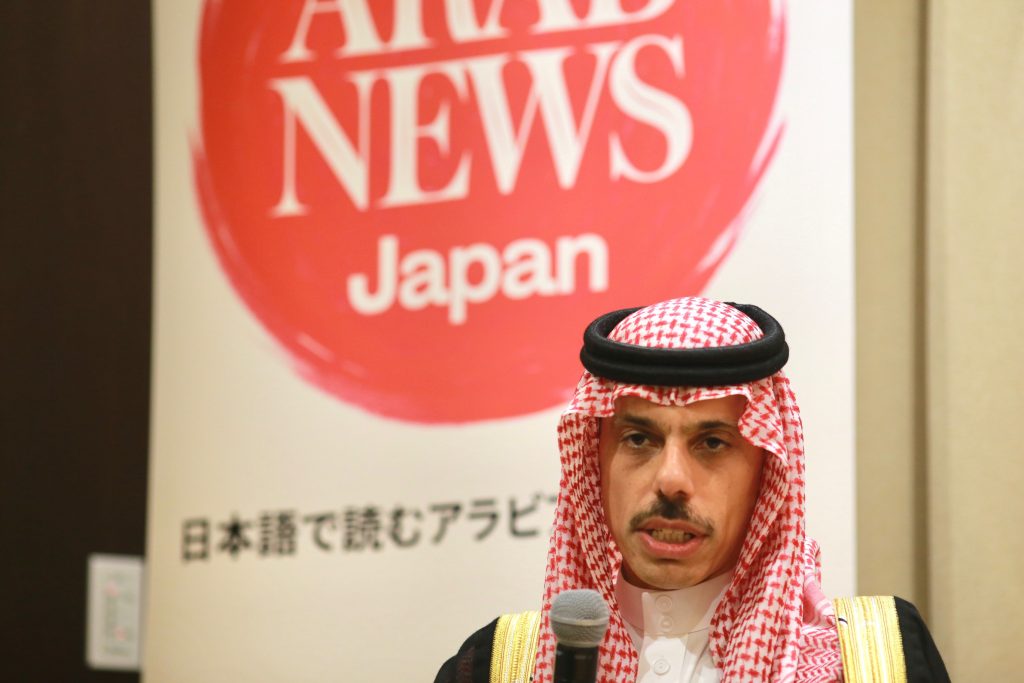
- ARAB NEWS
- 18 Jul 2025

Saudi Arabia’s Foreign Minister, Prince Faisal bin Farhan, chose a highly-flexible platform to set the record straight about the Kingdom’s future politics towards its eastern and western partners and towards its solid commitments that didn’t need any continuous assertion, even though, since the emergence of the Covid-19 crisis, the world in all its historical poles has sensed a strategic shaking that observers cannot miss.
The young minister chose to appear before a group of elites belonging to leading state and private Japanese news agencies, such as NHK, Kyodo News, The Asahi Shimbun, Jiji Press and Yomiuri Shimbun, in the Foreign Correspondents’ Club in Tokyo, the same place that warmly witnessed the launching of the Japanese version of the Saudi newspaper “Arab News” two years ago.
His appearance was a young attempt to address the modern consciousness that is being formed in the countries of the old-new friends. For his vital appearance, the minister chose this both formal and informal flexible spot.
He chose to come face to face with media institutions with long-established traditions, deep experience and worrying and sometimes skeptical questions.
He did so hours following the conclusion of the most prominent event in the Middle East – the US president’s time-sensitive participation in a major summit in the Saudi city of Jeddah, during which all big files were discussed before the Middle Eastern leaders – and presented a transparent briefing on the summit’s findings and the US president’s visit.
Timing wasn’t less sensitive in the East. History was on a random date with an individual killer who decided to assassinate one of the most important leaders of modern Japanese history, in a region that has always floated on invisible tensions and that needs far-sighted and unanimously-liked leaders, just like him.
It was the day on which ex-prime minister Shinzo Abe, “the Kingdom’s big friend” and “the highly-influential statesman” – as described by the minister in his funeral – succumbed to a fate that brought back one of the most pessimistic scenarios.
In similar circumstances, the minister firmly responds in the name of the Kingdom, to readdress from the East, with considerable vitality and boldness, the most influential foreign political headlines.
He reaffirmed the Kingdom’s explanation of the energy crisis, stating that it’s the result of refining inability rather than production scarcity, which is something significantly important to the Kingdom’s major partners, including Japan.
He also reaffirmed that OPEC+ will remain key to solving and stabilizing oil markets in any foreseeable future determined by the Kingdom.
His speech came after an interview for the Japanese prime minister and foreign minister, in a new boost at the highest levels for common files and compatible visions.
It is one of the examples that demonstrate the manifestation of the essence of the Kingdom’s foreign policy rhetoric.
In a world battling climate crises and geo-political dilemmas, and amid an international rhetoric characterized by timely opportunism, political hypocrisy and buzzing leaks, the Kingdom points out, with any available opportunity, its strategic priorities reflected in the details and fundamentals of its bold vision. Moreover, its past green initiatives do not fall on deaf ears whenever tensions arise elsewhere.
The minister clearly and transparently put the partnership of Saudi Arabia and Japan, through their joint vision, on its new track “after two years of suspension due to the repercussions of the Covid-19 crisis”, affirming in an interesting note that what we will do in the future will not overlook what has been done in the past.
Therefore, any matter that was put on hold due to a temporary crisis, can be resumed.
The killer’s gun caused a great tragedy with the loss of a unique leader like Shinzo Abe while delivering a peaceful and optimistic speech about the future.
It is a tragedy that caused “great sadness and major shock” in the Kingdom.
It is also the tragedy that brought back, during the late ex-PM’s funeral, the discussion on the joint desire to achieve the best for the future of both countries.
The Kingdom’s messages delivered through its foreign minister meant speaking out publicly about its renewed proposal that inspires an entire vision for the future and ideas of the world.